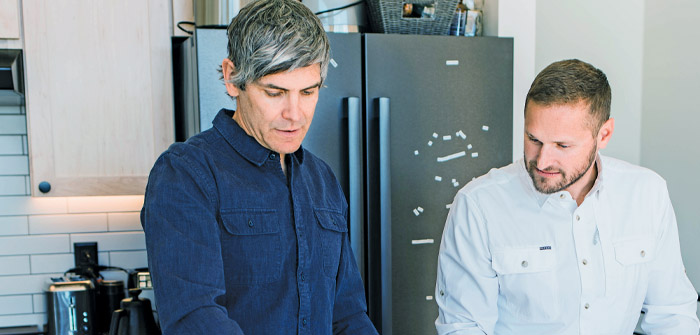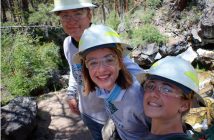(Hiatus CEO Jesse Russell with CFO Ryan Andrews | Photo courtesy of Hiatus Homes)
Bend-Based Developers Prize Sustainability, Density & Innovative Investment
As the demand for more attainable and more efficient housing ratchets up in Central Oregon, small home sustainability pioneers Hiatus Homes is answering the call through a collage of creative communities — and offering innovative opportunities for investors to support their evolution (see sidebar below).
Company founder and Bend native Jesse Russell said, “Hiatus Homes is part of a new movement in residential development through which we are building small footprint, high quality, ecologically sound and intelligently designed homes.
“Innovation in city codes, design and building is providing a new type of buyer with an opportunity to change their life and help heal our climate.”
Russell grew up in Bend and after a professional career working in the TV industry in Los Angeles and New York, made the life-changing decision to sell most of his possessions and return to his hometown to focus on building a tiny house.
Originally called Tongue and Groove Tiny Homes, the precursor to Hiatus Homes was born in 2015 when Russell built the first prototype as a tiny home on wheels in a friend’s backyard. Leading up to the launch of Hiatus, the team experimented with building tiny taverns on wheels, including two mini pubs and a food truck with taps.
After participating in the Bend Design Conference, and strengthening a commitment to the small home movement, the dream was nurtured to build an innovative community focused on small home design. Following three years of hard work interacting with the City of Bend, Russell was the first developer to use a newly introduced cottage code to pave the way for the inaugural Hiatus Homes community project.
Built on the foundation of creating livable spaces through creative and investigative design while keeping homes small, functional and highly energy efficient, the project known as Hiatus Benham was the first of two sold-out communities of homes completed by the company in Bend.
The initial project comprised 22 homes built in the “modern cottage” design style, in Southeast Bend, each studio of just under 600 square feet featuring space-saving design aspects and a focus on energy efficiency, as well as the community being structured to create engagement with neighbors amid community gardens and fire pits.
It sold out in 2020, followed by Hiatus Roanoke, featuring ten, two-bedroom two-bath zero energy-ready homes which were also rapidly snapped up by eager buyers by the beginning of 2022. The Roanoke homes were efficiently designed at just over 900 square feet of livable space plus a 357 square foot finished garage prepared as electric vehicle ready and finished as a flex space.
The high-performance homes also included engineered hardwood flooring, vaulted ceilings, quartz countertops, a standing seam metal roof, and a high-efficiency ventilation system with pollen filtration.
Hiatus Homes builds small houses with large ambitions, using advanced building techniques to reduce the energy needs of the home as much as possible with the goal of creating a house that produces more energy than it requires to achieve the “Zero Energy” goal.
The houses are insulated using a combination of GreenGuard Certified spray foam for the ceiling and blown-in insulation in the walls.
Once the house is complete, Energy Trust of Oregon performs a blower door test to capture the data on airflow coming in and out of the house.
Using that information along with appliance ratings and window selection, Hiatus Homes can predict how much energy is needed to run the house. After average energy use is determined, solar needs are assessed and a partnership with Bend’s Sunlight Solar allows for competitive photovoltaic pricing for customers to set up an optimal solution for their homes.
Small and efficient home living is a fast-growing trend in the US and Russell says living in a smaller home is one of the best ways to impact the environment in a positive way and fight climate change.
Buildings consume roughly 40 percent of the energy in the US annually and are responsible for nearly half of the carbon dioxide emissions. Residential homes make up an average of 20 percent of this energy usage.
Living in a small home effectively reduces carbon emissions and Hiatus homes are some 30-40 percent more efficient than the average American house.
The move in Bend has also been bolstered by a push to incentivize more of the perceived missing “middle housing” strata in Central Oregon after the state made history in 2019 by being the first to adopt legislation — known as House Bill (HB) 2001 — to effectively end single-family housing and pave the way for more diverse types of living options.
Bend became the first city of more than 25,000 people to comply with that enactment, in the shape of amendments to the Bend Development Code — to implement Senate Bill (SB) 458.
Along with other new development types such as micro-unit, small dwelling unit, and zero lot line developments, it formed part of a state-mandated effort to address ways to provide flexible, alternative and attainable housing types for a growing and diverse population within city limits.
The primary thrust of the legislation aims to provide more housing choices, especially housing choices more people can afford, and required updates to local codes that previously limited the type of housing people can build, as cities such as Bend strive to create incentives for, and remove barriers to, development of a variety of housing types in all residential zones.
Currently, Hiatus is working on several new developments including seven homes in the Old Mill District, with the majority accommodating an Attached Dwelling Unit (ADU) above a detached garage, nine Homes in the Orchard District and an innovative 40-unit apartment concept set to debut in 2023.
In more of a micro-housing style, the latter is a “first-of-its-kind” multi-family development in Bend’s Midtown area. To be known as Hiatus Penn Flats, it is envisioned as a stepped, three-story building with lofted flats and three common kitchen/living room facilities with a farm table for communal meals.
The building will also feature a workout room, communal workspace, raised decks, ground-level outdoor spaces and a rooftop fire pit and deck with views of Pilot Butte. Transportation includes car share parking as well as bike lockers and electric bike charging stations.
Environmentally-friendly laundry detergent brand Dirty Labs has been tapped to collaborate with Hiatus on a state-of-the-art laundry room for tenants.
The “intelligently designed” interior units will feature vaulted 13-foot ceilings, and large windows creating a flood of light into the space. Each unit is approximately 440 square feet with a lofted bedroom for additional space.
Russell, considered a thought-leader in the design and development of small spaces and communities, added, “Hiatus Homes is delivering the dream of living in Bend to more people, increasing housing density in the region and creating energy efficient, sustainable living with home models that are zero energy ready.”
Stake Offered in Hiatus Small Home Revolution
Hiatus Homes is actively looking for partners to continue to grow its groundbreaking small home community initiative, and zero-energy lifestyle, through the creation of a capital fund offering “mom and pop” investors the opportunity to participate in, and benefit from, nurturing its new wave in housing.
While Bend is the initial focus for Hiatus Homes in developing offerings, including the Midtown micro-apartment concept (see companion piece) the longer-term goal is to contribute to the small and energy-efficient living movement nationwide.
To that end, Hiatus Homes has launched The Hiatus Capital Fund to provide investors with an opportunity to be a part of this movement, and to generate long-term capital appreciation by providing the financial backing to make projects happen.
Hiatus CFO Ryan Andrews explained, “Our changing world requires changing models of living, especially when it comes to our homes and the way we build communities.
“Hiatus Homes builds beautiful, simple and energy efficient housing. Influenced by the tiny home movement, our small footprint homes help create urban density and help provide solutions to housing challenges.
“The Hiatus Capital Fund solves a funding challenge often associated with our building types and allows individuals to invest in our philosophy in a flexible way, while generating strong returns. With an ownership stake in our portfolio of developments, investors will receive profit distributions as the properties complete and sell to their new owners.
“We have seen a growing demand for this type of housing, with the homes in our Behnam Rd community, for example, reselling for 75 percent more just three years after they were built.”
The demand for smaller and more efficient housing is growing across the country, but the real estate development industry has been slow to catch up. Financing projects in this category is traditionally difficult, but Hiatus has innovated around this hurdle by creating The Hiatus Capital Fund.
Andrews added, “It allows mom and pop accredited investors to be a part of our home building philosophy. While real estate investments are typically capitalized one at a time, we have created an evergreen investment portfolio.
“Hiatus Homes has created not only an opportunity to usher in a new era of home building and real estate development, but also a new opportunity to invest in our future.
“People invest capital into the fund as part of their investment portfolio or retirement account and in doing so own a piece of each project.
“As the construction of homes is completed and they are all sold, a portion of the profit generated by the development is sent back to investors as a distribution.
“In the past only institutions, Wall Street or private equity funds had access to investment like this, but through the Hiatus Capital Fund, accredited investors are able to be a part of this growing trend in the housing market and benefit financially as well.
“We are giving our investors an opportunity to stay in the fund and grow with Hiatus Homes with maximum flexibility to choose when to pull their investment back out when they choose.
“With a minimum investment of $50,000, we have created a low barrier to entry for involvement in truly innovative home building.”
Hiatus is holding monthly webinars for potential new investors to learn more about this opportunity and anyone interested in finding out more information can visit the company website at hiatushomes.com.





